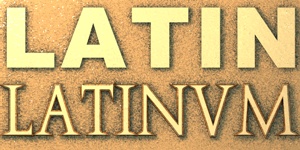





COMPRENDRE LES NOMS LATINS
Vous devez reconnaître le sens du nom, son cas PERE (génitif) et son genre. Souvent vous retrouverez une partie du nom latin dans un mot français de sens proche. Par exemple :
DOMINUS (I – masculin) : le maître (de maison) > En français, donne le mot Dominer.
REX (REGIS – masculin) : le roi (chef élu pour son talent) > Roi, diriger.
Vous saurez à quoi sert le nom dans la phrase, ainsi que son nombre (singulier ou pluriel) en repérant sa fin – et en vous rappelant sa forme du dictionnaire (« Dico »), et sa forme singulier PERE (génitif), toujours indiquée entre parenthèse après la forme du dictionnaire.
Le genre d'un nom (masculin, féminin, neutre) ne vous servira que pour retrouver les adjectifs qui l'accompagnent, ou les pronoms qui le remplacent.
LES POST-POSITIONS
Ce sont des petits mots que l'on colle à la fin d'un mot de la phrase pour attacher un sens à la totalité de la phrase à laquelle ils appartiennent.
-NE = transforme en question la phrase qui commence, avec un Oui ou un Non attendu.
-NONNE = transforme en question la phrase qui commence, avec un Oui attendu.
-NUM = transforme en question la phrase qui commence, avec un Non attendu.
-QUE = place le mot et la phrase qui suit dans le même sens que ce qui précède (« et »).
GUIDE DES TERMINAISONS DE NOMS
% représente l'absence des terminaisons de la liste. Dico signifie la forme du dictionnaire. Entre parenthèses la terminaison du cas PERE (génitif). Attention, ne confondez pas une terminaison plus longue avec une terminaison courte, par exemple -VS et -IBVS.
Le mot se termine par A. Dico = A, singulier MAITRE, HONOR, MOYEN. Dico = UM (I) ou US (IS), pluriel MAITRE, HONOR, OBJET.
|
Le mot se termine en AE. Dico = A, singulier PERE, BENEF. Pluriel MAITRE, HONOR.
|
Le mot se termine par AM. Dico = A, singulier OBJET. Le mot se termine en ARVM . Dico = A, pluriel PERE. Le mot se termine par AS. Dico = A, pluriel OBJET.
|
Le mot se termine par E. Dico = VS (I) singulier HONOR. Dico = ES (EI), VS, %, S ou IS (IS) singulier MOYEN. Dico = E (IS) singulier MAITRE, HONOR, OBJET.
|
Le mot se termine par EBUS. Dico = ES (EI), pluriel BENEF, MOYEN.
|
Le mot se termine par EI. Dico = ES (EI), singulier PERE, BENEF. Le mot se termine par EM. Dico = ES (EI), %, S ou IS (IS), singulier OBJET. Le mot se termine par ERVM. Dico = ES (EI), pluriel PERE.
|
Le mot se termine par ES. Dico = %, S ou IS (IS), pluriel MAITRE, HONOR, OBJET. Dico = ES (EI), singulier MAITRE, HONOR ; pluriel MAITRE, HONOR, OBJET.
|
Le mot se termine par I. Dico = VS, % ou VM (I), singulier PERE ; pluriel MAITRE, HONOR. Dico = %, VS, S, IS (IS), singulier BENEF. Dico = E (IS), singulier BENEF, MOYEN.
|
Le mot se termine par IA. Dico = E (IS), pluriel MAITRE, HONOR, OBJET.
|
Le mot se termine par IBVS. Dico = VS, E, %, S, IS (IS), pluriel BENEF, MOYEN.
|
Le mot se termine par IS. Dico = A ou VS, %, VM (I), pluriel BENEF, MOYEN. Dico = %, E, VS, S, IS (IS), singulier PERE Dico = S ou IS (IS), pluriel OBJET.
|
Le mot se termine par IVM. Dico = S ou IS (IS), pluriel PERE
|
Le mot se termine par O. Dico = VS, %, VM (I), singulier BENEF, MOYEN. Dico = O, singulier MAITRE. Attention : O est aussi la marque d'un verbe à la première personne.
|
Le mot se termine par ORIS. Dico = VS (IS), singulier PERE. Le mot se termine par ORUM. Dico = VS, %, VM (I), pluriel PERE. Le mot se termine par OS. Dico = VS, %, VM (I), pluriel OBJET.
|
Le mot se termine par ORIS. Dico = VS (IS), singulier PERE. Le mot se termine par ORUM. Dico = VS, %, VM (I), pluriel PERE. Le mot se termine par OS. Dico = VS, %, VM (I), pluriel OBJET.
|
Le mot se termine par V. Dico = VS (VS), singulier MOYEN. Dico = V (IS), singulier MAITRE, HONOR, OBJET, MOYEN.
|
Le mot se termine par VA. Dico = U (IS), pluriel MAITRE, HONOR, OBJET. Le mot se termine par VI. Dico = US (US) ou U (US), singulier BENEF.
|
Le mot se termine par VM. Dico = VS (I), VS (VS), % ou VM (I), singulier OBJET. Dico = VM (I) singulier MAITRE, HONOR. Dico = % ou VS (IS), pluriel PERE.
|
Le mot se termine par VVM. Dico = VS (VS) ou V (VS), pluriel PERE.
|
Le mot se termine en VS. Dico = VS (I), singulier MAITRE. Dico = VS (IS), singulier MAITRE, HONOR, OBJET.
|
Le mot n'a aucune terminaison (%) Dico = % (I) (IS), singulier MAITRE, HONOR.
|
